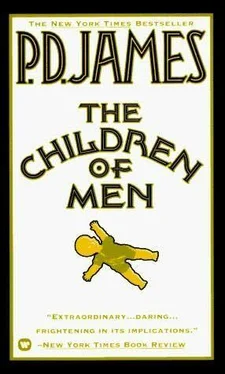As he paid her he said: “It was good of you to take me in, a solitary man and without an overnight bag. Some people might have been reluctant.”
“Oh no, I wasn’t at all surprised to see you. I wasn’t worried. You were an answer to prayer.”
“I don’t think I’ve ever been called that before.”
“Oh, but you were. I haven’t had a B and B for four months now and one feels so useless. There’s nothing worse than feeling useless when you’re old. So I prayed that God would show me what I ought to do, whether there was any point in carrying on. And He sent you. I always find, don’t you, that when you’re in real trouble, faced with problems which seem too much for you, and just ask, He does answer.”
“No,” he said, counting out the coins, “no, I can’t say that’s been my experience.”
She went on as if she hadn’t heard him: “I realize, of course, that I shall have to give up eventually. The little town is dying. We aren’t scheduled as a population centre. So the newly retired don’t come here any more and the young leave. But we shall be all right. The Warden has promised that everyone at the end will be cared for. I expect I’ll be moved to a little flat in Norwich.”
He thought: Her God provides the occasional overnight customer, but it is the Warden she relies on for the essentials. On impulse he asked: “Did you see the Quietus here yesterday?”
“Quietus?”
“The one held here. The boats at the pier.”
She said, her voice firm: “I think you must be mistaken, Mr. Faron. There was no Quietus. We have none of that kind of thing in Southwold.”
After that he sensed that she was as anxious to see him go as he was to leave. He thanked her again. She hadn’t told him her name and he didn’t ask. He was tempted to say: “I’ve been very comfortable. I must come back and spend a short holiday with you.” But he knew that he would never return and her kindness deserved better of him than a casual lie.
Next morning he wrote the single word YES on a postcard and folded it carefully and precisely, running his thumb along the crease. The act of writing those three letters seemed portentous in ways he couldn’t as yet foresee, a commitment to more than his promised visit to Xan.
Shortly after ten o’clock he made his way over the narrow cobbles of Pusey Lane to the museum. A single custodian was on duty, seated as usual at a wooden table opposite the door. He was very old and he was sound asleep. His right arm, curved on the table-top, cradled a high-domed, speckled head spiked with bristles of grey hairs. His left hand looked mummified, a collection of bones loosely held together by a stained glove of mottled skin. Close to it lay an open paperback, Plato’s Theaetetus. He was probably a scholar, one of the unpaid band who volunteered to take turns and to keep the museum open. His presence, asleep or awake, was unnecessary; no one was going to risk deportation to the Isle of Man for the few medallions in the display case, and who could or would want to carry out the great Victory of Samafaya or the Wings of the Nike of Samothrace?
Theo had been reading history, yet it was Xan who had introduced him to the Cast Museum, entering it light-footed, as joyously expectant as a child with a new nursery of toys showing off its treasures. Theo, too, had fallen under its spell. Even in the museum their tastes differed. Xan liked best the rigour and the stern unemotional faces of the early-classical male statues on the ground floor. Theo preferred the lower room, with its examples of the softer, flowing Hellenistic lines. Nothing, he saw, was changed. Casts and statues stood ranked under the light of the high windows, like the closely packed lumber of a discarded civilization, the armless torsos with their grave faces and arrogant lips, the elegantly dressed curls above bound foreheads, eyeless gods secretly smiling, as if they were privy to a truth more profound than the spurious message of these ice-cold limbs: that civilizations rise and fall but man endures.
As far as he knew, once he had gone down Xan had never revisited the museum, but to Theo it had become a place of refuge over the years. In those dreadful months following Natalie’s death and his move to St. John Street, it had provided a convenient escape from his wife’s grief and resentment. He could sit on one of the hard utilitarian chairs, reading or thinking in this silent air, seldom disturbed by a human voice. From time to time small groups of school children or individual students would come into the museum and then he would close his book and leave.
The special atmosphere which the place held for him depended on his being alone.
Before doing what he had come to do, he walked round the museum, partly from a half-superstitious feeling that, even in this silence and emptiness, he should act like a casual visitor, partly from the need to revisit old delights and see if they could still touch him: the Attic gravestone of the young mother from the fourth century B.C., the servant holding the swaddled baby, the tombstone of a little girl with doves, grief speaking across nearly three thousand years. He looked and thought and remembered.
When he came up again to the ground floor he saw that the attendant was still asleep. The head of the Diadoumenos was still in its place in the ground floor gallery but he looked at it with less emotion than when he had first seen it thirty-two years ago. Now the pleasure was detached, intellectual; then he had run his finger over the forehead, had traced the line from nose to throat, shaken with that mixture of awe, reverence and excitement which, in those heady days, great art could always produce in him.
Taking the folded postcard from his pocket, he inserted it between the base of the marble and the shelf, its edge just visible to a keen and searching eye. Whoever Rolf sent to retrieve it should be able to dislodge it with the tip of a fingernail, a coin, a pencil. He had no fear of anyone else finding it and, even if they did, the message could tell them nothing. Checking that the edge of the card could be seen, he felt again the mixture of irritation and embarrassment which he had first felt in the church at Binsey. But now the conviction that he was becoming unwillingly involved in an enterprise as ridiculous as it was futile was less powerful. The image of Hilda’s half-naked body rolling in the surf, of that thin, wailing procession, the crack of a gun on bone; these imposed dignity and seriousness on even the most childish games. He had only to shut his eyes to hear again the crash of the falling wave, its long withdrawing sigh.
There was some dignity and much safety in the self-selected role of spectator, but, faced with some abominations, a man had no option but to step onto the stage. He would see Xan. But was he motivated less by outrage at the horror of the Quietus than by the memory of his own humiliation, the carefully judged blow, his body hauled up the beach and dumped as if it were an unwanted carcase?
As he was passing the table on his way to the door the aged custodian stirred and sat up. Perhaps the footfall had penetrated his half-sleeping mind with a warning of duty neglected. His first gaze at Theo was one of fear almost amounting to terror. And then Theo recognized him. He was Digby Yule, a retired classics don from Merton.
Theo introduced himself. “It’s good to see you, sir. How are you?”
The question seemed to increase Yule’s nervousness. His right hand began an apparently uncontrolled drumming of the table-top. He said: “Oh, very well, yes, very well, thank you, Faron. I’m managing all right. I do for myself, you know. I live in lodgings off the Iffley Road but I manage very well. I do everything for myself. The landlady isn’t an easy woman—well, she has her own problems—but I’m no trouble to her. I’m no trouble to anyone.”
Читать дальше












